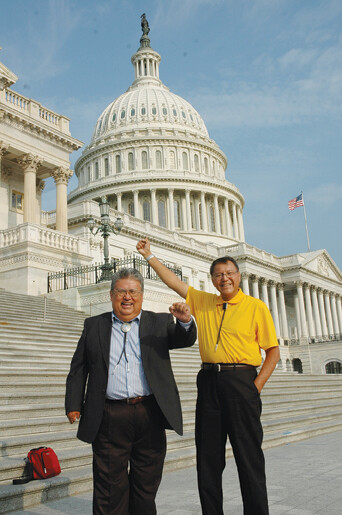
Area UMW connects with uranium widows
BY CARRIE MADREN
UMCONNECTION CORRESPONDENT
When the United Methodist Women of Asbury-Town Neck UMC were asked to provide transportation for a group of Navajo people who were visiting Washington, D.C., they agreed, not knowing they were beginning a soul-shaping relationship.
Showing hospitality to the Navajo group helped the women to transcend the boundaries of comfort and truly live out Jesus' question of "who is our neighbor," said the Rev. Kay Albury, pastor at Asbury-Town Neck in Severna Park.
"We're all intricately bound together," Albury said. "Injustice anywhere is injustice everywhere. It just has a different face and different culture, maybe a different color, but it's the same problem of injustice."
The justice the Navajo visitors sought revolved around a century-old issue. In mid-September, these 20 men and women launched out on their history journey.
 Many of them are in their 80s, widows of former uranium workers. It was their first time leaving their families and their homeland in New Mexico, as well as their first time flying in an airplane, riding escalators and experiencing other technology.
Many of them are in their 80s, widows of former uranium workers. It was their first time leaving their families and their homeland in New Mexico, as well as their first time flying in an airplane, riding escalators and experiencing other technology.
"The trip was made in an effort to gain awareness; we were requesting an epidemiological health study on women and children exposed to take-home uranium - that's uranium brought back from the mines on clothes," said Gilbert Badoni, president of the grassroots organization Navajo Nation Dependents of Uranium Workers Committee, which began in 1999.
Uranium mining took place from roughly the early 1920s through 1971. Men worked in the mines by day, not knowing the harm that this toxic element caused, and returned home at night with the poison still lingering on their clothes. Some men even brought water back from the mines - because it was clear and tasted fine - to use at home for cooking or other uses. Others built houses with uranium tailings and rocks, unknowingly constructing a home of poison.
Exposure to uranium has caused a slew of abnormal health problems and illnesses for the Navajo people, including a range of cancers, birth defects, tumors, thyroid problems, fibrosis and more.
For the health study, the Committee requested $500,000 to fund an independent, unbiased research group to investigate the extent of the uranium-related health problems, including neuropathy from uranium-contaminated drinking water. (Among the widows who came to Washington, one had lost seven children to neuropathy,
Badoni said.)
To make the trip a success, logistical help was needed for the D.C. visit, and it was serendipity that led Sandy Ferguson, Baltimore-Washington Conference's Director of Social Justice and Mission, to contact Asbury-Town Neck UMC for help in transporting the Navajo group from their hotel to Capitol Hill.
Just this summer, a United Methodist Women's School of Missions study group focused on
Navajo women and their plight, Albury said.
"Several women in that study group felt that they really hadn't filled missional goals this year, and so it was both irony and blessing," she added.
Asbury-Town Neck's charter bus was just the ride. "The other piece of irony was that I had been preaching on prayer and fasting," Albury said. "And our fasting and praying amounts to nothing unless it's connected to something." The timing was perfect to help out.
"We were quite surprised, we were expecting a minvan, but they pulled up in a big bus," Badoni said. "That really cut our costs because we didn't have to pay for taxis."
During the Navajo group's stay in Washington, they ate lunch at the General Board of Church and Society, joined by women from the Asbury-Town Neck's UMW and Bishop John Schol.
"Not only did Kay (Albury) and the women come to pick them up. she prayed with them, and they spent the whole day with them," Ferguson said.
Not all of the Navajo women spoke English, but both groups of women forged bonds of sisterhood.
"We built a sense of community," Albury said. The Marylanders treated the Navajo group to a D.C. soul food dinner at a restaurant known locally as Daddy Grace's.
"We found ourselves talking and chit-chatting, but more importantly, we showed hospitality and solidarity," said Albury.
The UMW wants to offer more support, including writing to Congress on behalf of the Navajo women and praying for the group. If mission dollars are available to direct towards their efforts, Albury said, her church will help.
A documentary film from the Sundance Film Festival about the uranium widows can be viewed at www.navajoboy.com.

Login/Register to leave comment